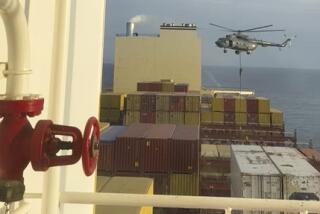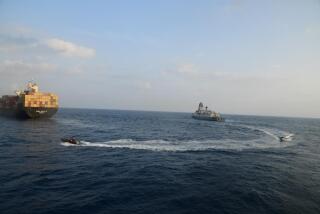Freed British sailors say their confessions were coerced
- Share via
LONDON — For two weeks, their televised confessions were seen by many here as a humiliating case of “surrender first and apologize after” by the British navy. But on Friday, the sailors and marines who spent 13 days in an Iranian jail said that they were blindfolded and threatened into fabricating their confessions.
Their dramatic account, given a day after leaving Tehran with gift bags of sweets and pistachios, appeared to turn Iran’s carefully crafted public relations script on its head. Several of the Britons told of being locked in isolation for days and said they were threatened with seven years in prison if they did not admit entering Iranian waters while sailing in the Persian Gulf.
“When we first went to prison, we were put up against a wall, hands bound, blindfolded, and there were people cocking weapons in the background,” Lt. Felix Carman said at a news conference with six other former captives.
Marine Joe Tindell, 21, told the BBC: “Someone said, I quote: ‘Lads, lads, I think we’re going to get executed.’ After that comment someone was sick, and as far as I was concerned he had just had his throat cut.”
Faced with a growing tide of public questions over their conduct, the sailors and marines said they had no choice but to surrender to the “heavily armed force” that confronted them.
“Let me be absolutely clear, from the outset it was very apparent that fighting back was simply not an option. Had we chosen to do so, then many of us would not be standing here today,” Marine Capt. Chris Air said.
“We were not prepared to fight a heavily armed force who, it is our impression, came out deliberately into Iraqi waters to take us prisoner,” he said. “We did our utmost to de-escalate the situation, but our words fell on deaf ears. They had come with a clear purpose, and were never going to leave without us.”
Air and his fellow former captives said all the navigation equipment they had on board during the incident showed without doubt that they were 1.7 miles inside “internationally recognized Iraqi territorial waters.” Their public confessions, Carman said, were the result of intense pressure from the Iranians.
“We were interrogated most nights, and presented with two options,” he said. “If we admitted we had strayed, we would be on a plane back to the UK soon. If we didn’t, we faced up to seven years in prison.
“At all times, if you listen carefully to what we said, we always used words like ‘apparently’ or ‘we were perceived’ or ‘according to this evidence.’ At no time did we actually say we apologize for intruding in Iranian waters,” Carman added. “At all times, we stuck to our guns and we were conducting our operations legally.”
The news conference was seen by many in Iran on Al Jazeera’s English-language broadcast, but there was no immediate official reaction.
Only days before, viewers had seen smiling images of the British captives apologizing for entering Iranian waters, and thanking Iranian officials for what they said was good treatment.
“I cannot be sure who is right, who’s telling the truth. But I prefer to believe my fellow countrymen are telling the truth,” said Mahmoud Fadri, editor of Iran’s Kargozaran daily newspaper, which is close to former President Hashemi Rafsanjani.
Iranian President Mahmoud Ahmadinejad appeared dismissive of British Prime Minister Tony Blair’s accusation that “elements” of the Iranian government were “backing, financing, arming, supporting terrorism in Iraq.” Asked his response, the Iranian president laughed. “Mr. Blair says such things a lot. I’m sorry that he says things like that,” he said in a brief statement to The Times.
British naval authorities announced Friday that they had suspended operations in the northern Persian Gulf, conducted under a United Nations mandate with the U.S. and Australia with the aim of protecting Iraqi oil shipments and guarding against the transport of weapons into Iraq. Navy officers are reviewing whether procedures and rules of engagement are appropriate in light of the confrontation, reminiscent of Iran’s capture of eight British sailors and marines in 2004.
First Sea Lord Adm. Jonathon Band told the BBC that the U.S. and Australia would continue search operations in the area. He expressed unqualified support for the crew’s conduct.
“It is quite clear to me, in the context of the operation that morning, with the force that was shown against them, they made exactly the right decision,” Band said.
The admiral had faced a grilling earlier in the day by BBC Radio 4’s “Today” program, whose host, John Humphrys, summed up the British media reaction thus far: “What actually happened is that you surrendered first and apologized after,” he suggested. “This was not your finest hour, was it?”
But Friday’s news conference appeared to ease most public doubts about the conduct of the 14 men and one woman during their imprisonment.
“I think they came out absolutely outstandingly,” said Christopher Bellamy, a professor of military science at Cranfield University who, as a war correspondent in Bosnia-Herzegovina, was captured and held for 30 hours.
“Anybody with half a brain knows they were in Iraqi waters when they were captured, and the obligation now is on the more senior echelons of the Royal Navy to explain how they were not more effectively defended while conducting their United Nations-sanctioned mission,” Bellamy said.
The families of the former captives described a sense of shock at meeting them when they arrived home Thursday.
“Within about eight minutes, I was a dripping wreck, basically,” said John Tindell, Joe’s father, in an interview with the BBC. “I’m shaking with rage at what’s been done to Joe and some of the lads.”
The sailors said Friday that they were conducting a routine search of a merchant vessel on March 23 just south of the Shatt al Arab waterway when they saw two speedboats approaching.
“I ordered everyone to make their weapons ready and ordered the boarding party to return to the boats,” Air said. By the time everyone was back on board, two Iranian boats had pulled alongside their small inflatable crafts. Air said that he explained their mission to an officer who spoke good English but that when they tried to leave, the Iranians blocked their departure.
“Some of the Iranian sailors were becoming deliberately aggressive and unstable,” he said. “They rammed our boat and trained their heavy machine guns, RPGs [rocket-propelled-grenade launchers] and weapons on us.”
Six more Iranian boats were closing in, Air said.
“We realized that had we resisted, there would have been a major fight, one we could not have won, with consequences that would have had major strategic impact,” he said.
He said the Iranians boarded their boats, removed their weapons and took them to a small Iranian naval base, where they were blindfolded and relieved of their gear.
Two hours later, they were moved to another location and subjected to “random interrogations,” Carman said. “The questions were aggressive and the handling rough, but it was no worse than that.”
The next morning, they were flown to a prison in Tehran, “where the atmosphere changed completely,” he said. They were blindfolded, bound and forced up against a wall, and later dressed in pajamas and placed in individual 8-by-6-foot stone cells, where they slept on piles of blankets, he said.
Special correspondent Ramin Mostaghim in Tehran contributed to this report.
More to Read
Sign up for Essential California
The most important California stories and recommendations in your inbox every morning.
You may occasionally receive promotional content from the Los Angeles Times.










